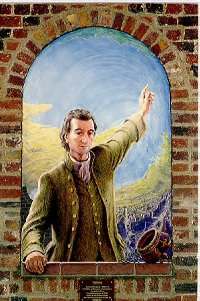See Dissecting Deism Past and Present
Deism Depicted
by Tracy Van Pelt
World Literature
Paper #1
Every individual has the mental capacity to think freely and can determine and imagine a perfect world for the human-race. We should not rely solely on pre-established thoughts and human-formed institutions, but we should adhere to our own beliefs through contemplation of knowledge and experience. It is certain that God created every person dependent on nature and granted us the ability to interpret and utilize nature with our intellectual capacities.
Realizing the interdependence of humans granted with nature should conclude for people to come together and assist each other in the development of each others well-being in a universal system. We can evolve by facilitating each others creative capabilities upon the basic needs provided through nature to sustain life and security. Ignorance, as portrayed in the tale Candide, causes immorality and negatively effects humanity. Voltaire's personal beliefs, Deism, are revealed through the Land of Eldorado in which his ideal world has been realized.
Voltaire's Deist beliefs can be seen by the absence of any religion within Eldorado. When Candide and Cacambo travel to Eldorado they are astonished and bewildered by the difference of nature from their own, as well as for the rest of the world (Voltaire, 548). Candide insists on figuring out how the society operates in such a delightful manner.
Candide and Cacambo's interactions with the old gentleman reveal that religion is not part of their behavior. The old gentleman tells them that the people of Eldorado worship God from morning to evening. Further, he explains, the inhabitants do not pray to God at all because everything has already been granted and thankfulness is continually done. Candide is shocked to find out that the people of Eldorado consider themselves all priests (Voltaire, 549).
The actions of the people in Eldorado display their beliefs in Deism. "Deism rejects the "revelations" or the "revealed" religions but does not reject God. Deism is based on nature and reason, not "revelation". In Deism there is no need for a preacher, priest or rabbi. All one needs in Deism is their own common sense and the creation to contemplate" (Deism Defined, 1). The people of Eldorado seek a personal relationship with God, and therefore do not need to conform to religious institutions. The people do not need to find acceptance from God, as religion installs, because God has predetermined, accepted, and given all which is needed to sustain life, nature.
Voltaire portrays in Eldorado the stupidity of overemphasizing value on specific natural resources. As strangers, Candide and Cacambo were overwhelmed with the Eldorado's gold, rubies, and emeralds. The king responded to Candide's desire of wanting to take these natural resources by laughing at him, and then stating "I simply can't understand the passion you Europeans have for our yellow mud; but take all you want , and much good may it do you" (Voltaire, 551).
Voltaire's reasoning for doing this is to show how shallow it is to value one natural resource over another, as living existence could not survive without other resources; nature is interdependent. Deism is the study of nature (Buehner, 1). The value that has been placed on gold from previous times has yielded financial poverty and oppression and has misplaced status and recognition to belligerent and ignorant men. "Much of the evil in the world could be overcome or removed if humanity had embraced our God-given reason from our earliest evolutionary stages" (Deism Defined, 2).
The value that has been applied to gold has become a motive that can lead to immoral behavior, whereas it entails financial security within developed societies. Voltaire implies that gold is useless if it does not supplement the creative means of having a positive impact on the progression of human existence. Gold is of no value without human application.
The people of Eldorado are active with the progression of discoveries for the improvements of life. A characteristic of Deism is the encouragement of scientific inquiry. Through scientific advances people's faith will recede (The Three..., 1). Through the studies of science, a person's idea of a pre-determined destiny can subside, and the reliance on human mental capacities can manifest.
As Candide tours Eldorado, he gains the most pleasure by viewing the palace of sciences which is entirely filled with mathematical and physical instruments. When Candide and Cacambo decide to leave Eldorado, the engineers make a machine that will carry them over the mountains conveniently (Voltaire, 550-551). The proficiency of being able to enhance the conditions of life is the effect of human's cause through work. The aspect of the Land of Eldorado being the most technologically evolved within the tale portrays an attribute that Voltaire, as a Deist, would favor.
The Land of El dorado is where Voltaire reflects his Deist beliefs of a prominent society. Deists believe in the perfectibility of man (The Three...,1). Voltaire exposes throughout Candide the various ways people can conduct their lives; he shows how people have created languages, determined societies, and established religions, which have set barriers between the human-race. Eldorado is the only civilization within the tale that peace and harmony is obtained between the people by distinguishing between human's creations derived from God's creation, nature.
The people of Eldorado find mental stability by developing their free-minds to reason for truth upon nature and being active in work with their creative abilities for self-fulfillment. Deists adhere to a universal code to love (care) for everyone as we are all part of existence. "Voltaire holds that it is the true religion that one loves God and loves others like one's own siblings" (The Philosophies...,1). Deists are optimistic towards perfecting humanity by striving for personal and interpersonal growth with the understanding of the world's elements, as in the Land of Eldorado.
Works Cited
Buehner, David Loren. "Deism Defined." A Non-Religious Naturalistic Perspective on
God. 2001
http://www.geocities.com/deism101us/deismdefined.html
Deism Defined. http://www.deism.com/deism_defined.htm
Deism in the Colonies.
http://www.keyano.ca:8080/bhemstock/eng1358/deism/sld005.htm
Loflin, Lewis. Deism/Unitarianism Versus Christianity.
https://sullivan-county.com/identity/hi_christy.htm
The Philosophies of Enlightenment.
http://www.csudh.edu/phenom_studies/western/lect_8html
The Three Characteristics of the Enlightenment
http://www.keyano.ca:8080/bhemstock/eng1358/deism/sld002.htm
Voltaire's Deism. http://www.deism.com/Voltaire.htm
Voltaire, Francois-Marie Arouet De. "Candide". The Norton Anthology of World
Literature. Vol. D. New York/London: W Norton and Company, 2002. 517-580.
- Quakers and Deism
- Deism by Richard Hooker
- What is Natural Theology?
- Isaac Newton and Arianism
- Isaac Newton's God
- Deception of Deism
- Deist Minimum
- Natural Law and a Nihilistic Culture
- Reasonable Science, Reasonable Faith
- Was Washington Really a Deist?
- God of Abraham and the Enemies of "Eurocentrism"
History
- Left vs Right, Montesquieu, Corporatism
- Another Look at Religion in America 2008
- Comparison between Deism and Christianity
- Eastern Roman Empire and Islam
- Philosophies of Islam, Greece, and the West by Turgut Ozal
- Example of Islam and science.
- Maimonides Versus Aristotle and the Jews of Spain, Thirteen Rules
- Handbook on the History of Modern Science
- Islam Versus Deism
- Left vs Right, Montesquieu, Corporatism
- Eastern Roman Empire and Islam
- Philosophies of Islam, Greece, and the West by Turgut Ozal
- Example of Islam and science.
- Maimonides Versus Aristotle and the Jews of Spain, Thirteen Rules
- Handbook on the History of Modern Science
- Pelagius and why he was right
- Islam Versus Judaism and Christianity
- Islam to Deism: Why I became a Deist
Web site Copyright Lewis Loflin, All rights reserved.
If using this material on another site, please provide a link back to my site.

